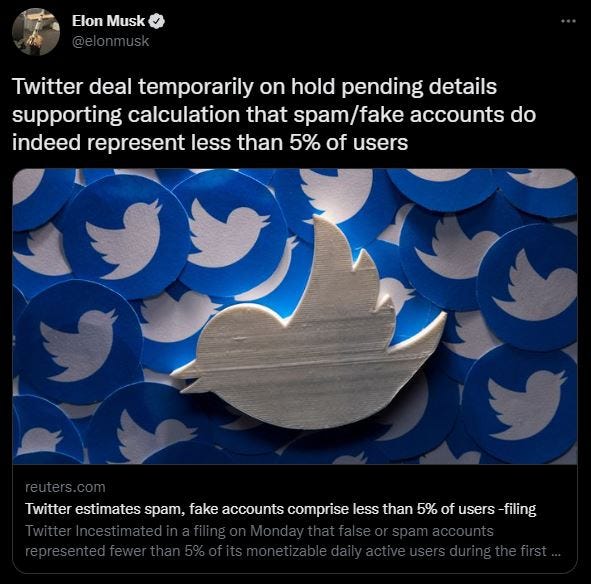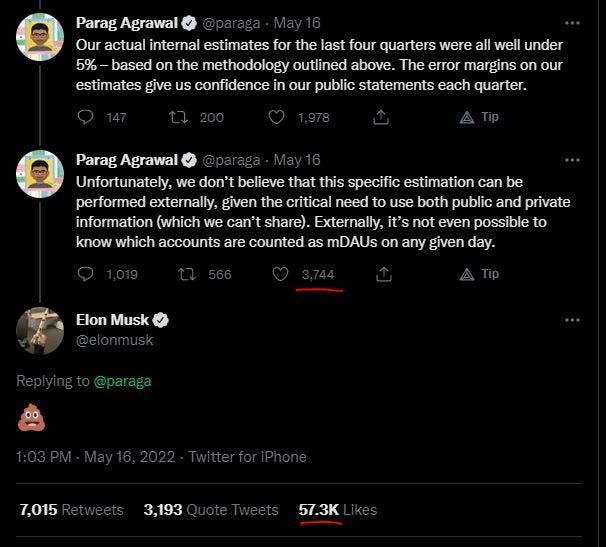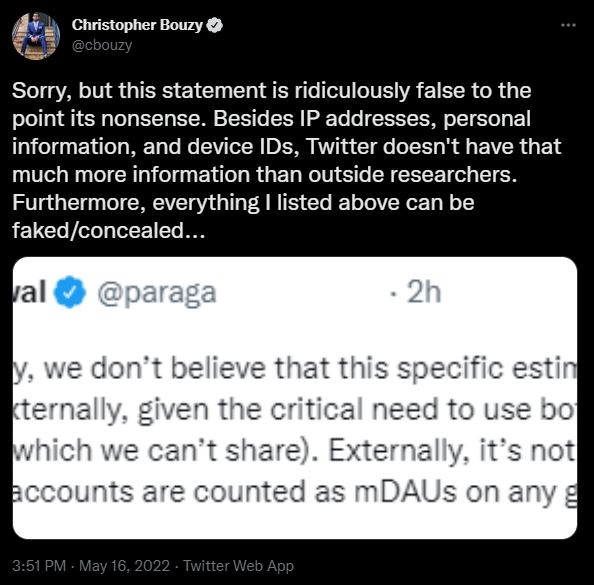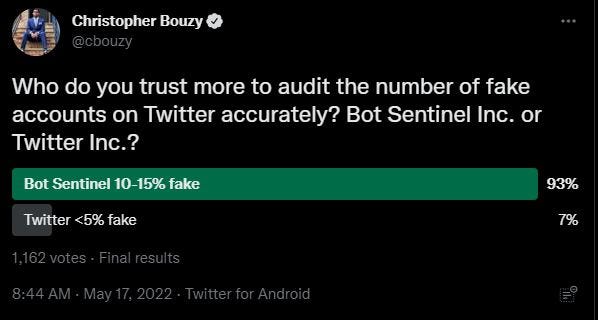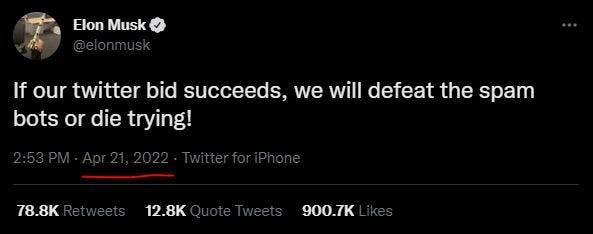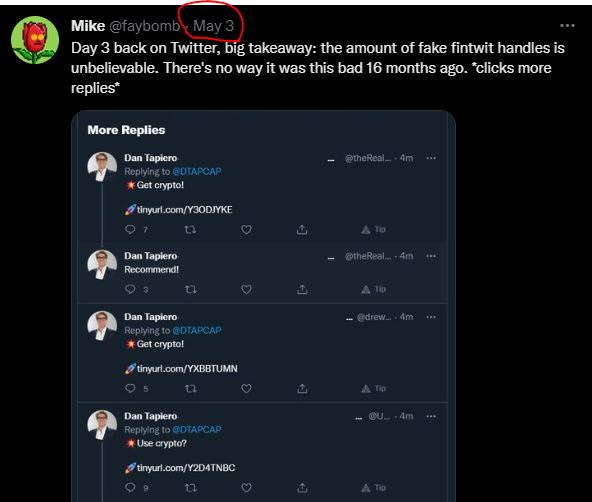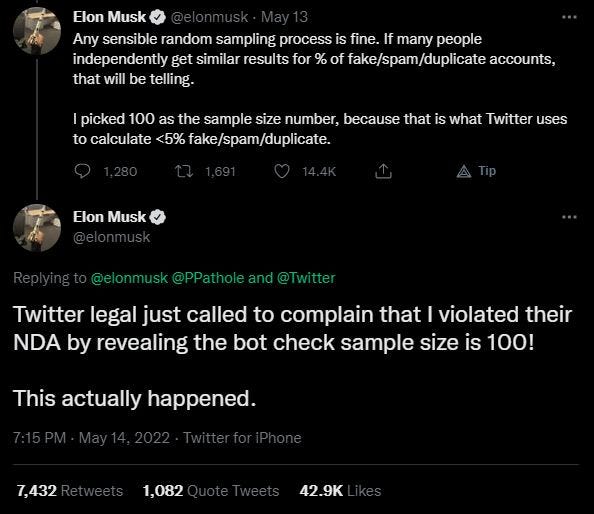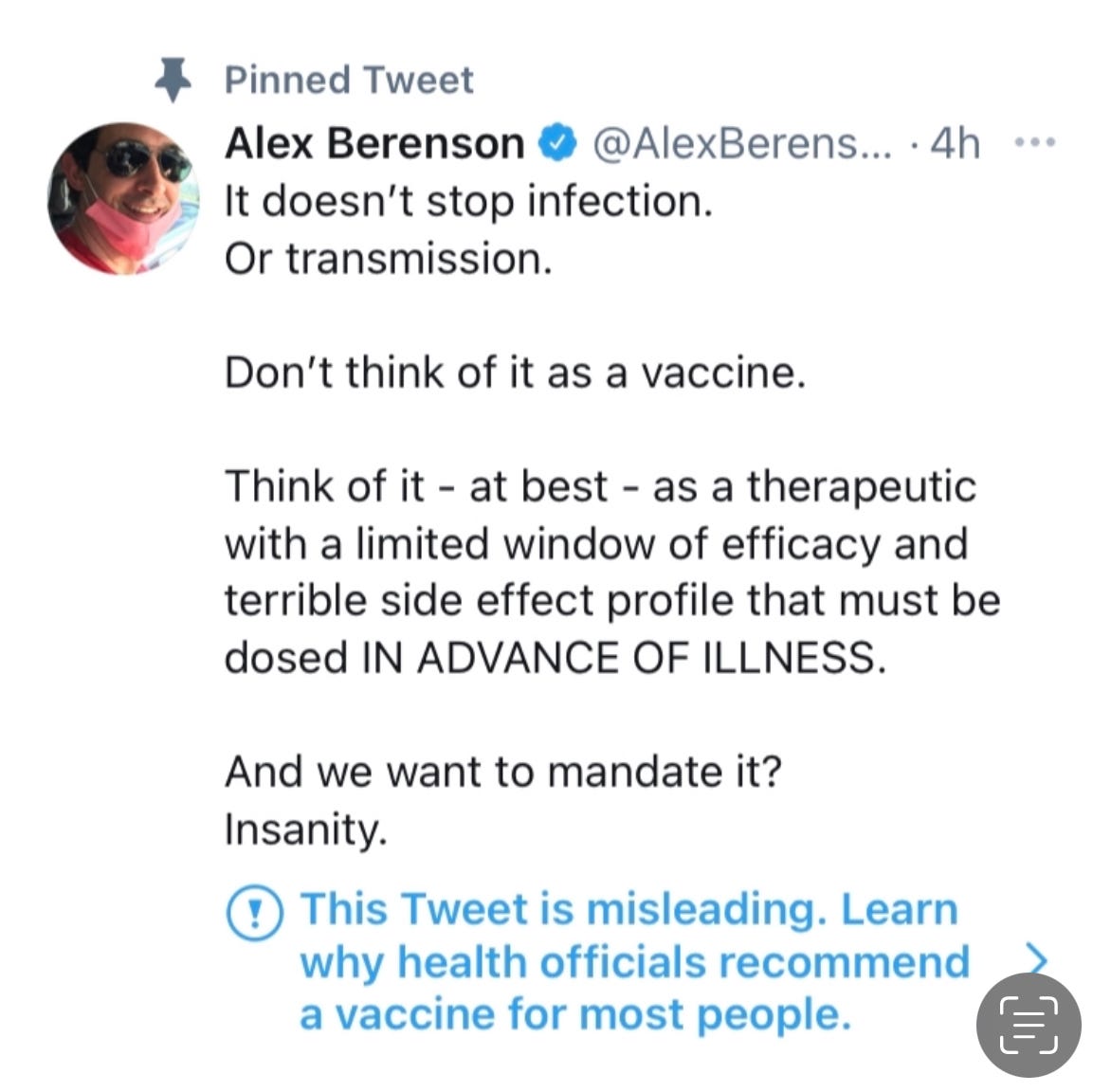Bots, Emojis, Hidden Cameras & Hate: The Twitter Saga Continues
It's been an absolutely bonkers week of developments in the Twitter story. Musk wants out. Twitter wants the deal to continue. Bots are everywhere and Project Veritas keeps dropping bombs.
I know. I said I was going to stop talking about Twitter (TWTR). I lied. It’s impossible not to acknowledge everything happening in the broad story arch of Twitter’s 2022. The Netflix documentary about all of this is going to be amazing. In addition to Elon Musk very predictably trying to back out of his takeover bid now that the broad market is in full meltdown mode and it’s clear his price is way too high, Project Veritas has released not one, but two hidden camera videos showing Twitter employees sayin’ some things.
Musk The Shitposter
First things first; this Elon/Twitter takeover deal seems very much up in the air, at this point. Who could have possibly guessed?
I am not of the belief that the sale to Musk is a certainty to close.
-ya boi (5/2/22)
On May 13th, Elon Musk tweeted that the agreed upon deal where he’d buy Twitter for $44 billion was on hold:
His rationale was that Twitter’s public filings significantly understated the amount of bot accounts on Twitter. The implication being Musk agreed to a purchase price with the understanding that 95% of the mDAUs (monetizable daily active users) on the platform were actually real people. Musk even attempted to quantify the real number of bot accounts himself by crowdsourcing data. Parag Agrawal, who is still in fact Twitter’s CEO, was having none of that:
The tweet above garnered a poop-emoji response from Musk. I swear I’m not making any of this up. Agrawal’s assertion that external companies couldn’t estimate Twitter’s bot problem better than Twitter’s internal metrics received a strong response out of BotSentinel’s Christopher Bouzy:
Bouzy followed that Tweet with what turned out to be a pretty straightforward flex:
It’s been fascinating watching someone like Bouzy, who by all indications doesn’t like Musk or his proposed policy changes, somewhat corroborating Musk’s point that Twitter’s bot estimates are way off what is stated in disclosures. All that said, there is just absolutely no way Musk couldn’t have known Twitter’s bot estimate was understated before agreeing to buy the company. In fact, in April before there was an agreement in place, Elon Musk specifically mentioned the bots as a platform improvement initiative:
Believe it or not, I even tweeted about the bot problem right after rejoining the platform, nearly two full weeks before Musk’s attempt to back out of the deal:
As I write this, I have 24 Twitter followers; I can guarantee that 9 of them are real people who I’ve met in person. 5 are absolutely fake fintwit spam accounts. I have no idea on the remaining 10. At minimum, 20% of my followers are fake accounts though it’s probably higher. The point is, Twitter has a serious bot problem. It’s obvious to anyone who has used it recently. While I don’t recall it being this bad when I left early last year, there’s no denying the bot issue is apparent. This brings us to what Musk is really trying to accomplish with all of this.
While you could probably argue Elon Musk is in DGAF mode, I think what is actually happening behind the façade of a bot metric argument is Musk knows he’s overpaying for Twitter at $44 billion. Twitter knows this as well which is why the company is laying off corporate bloat and aggressively trying to complete the transaction at the agreed upon terms. Will Musk finagle a lower price or get out of the deal entirely? I’m not sure. But I can’t wait to see how it all plays out. And the best seat in the house is on Twitter.
Videos via Veritas
Elon is the new Trump.
That quote is from a recently released undercover video by Project Veritas. The video is of Siru Murugesan, a senior engineer with Twitter. The whole video is worth a watch but here are some of his other quotes that I think are incredible:
Twitter does not believe in free speech. Twitter wants to censor bullying and harassment and the idea of free speech is that you can bully and harass people. And Twitter does not believe in this value as a platform. Because it’s not conducive to business.
A quick sidebar on the quote above: it was juxtaposed with another quote about how Twitter personnel want to keep left-leaning users engaged with the platform and right-leaning users don’t matter as much. Essentially, “conducive to business” was framed as keeping the left happy. Anyway more quotes:
I basically went to work like four hours a week last quarter. And that’s just how it works.
Everyone gets to do what they want. Nobody really cares about op-ex. Like capitalists, they care about numbers or care about how to make the business more efficient. Capitalists would be like ‘you gotta make profits or you’re out.’ A lot of people won’t survive in that culture.
On the internal vibe since Elon Musk’s buyout bid:
A lot has changed. We’re stress eating a lot. Like we’re always worried for our jobs.
Between the buyout drama and these coddled employees, imagine being a shareholder of this company. I mean Jiminy Christmas. Twitter’s share price lag against most of the other popular social media platforms makes a lot of sense, doesn’t it?
Without touching too much on the freedom of speech component, I think I’ve made my feelings on that pretty clear, I think the stated censorship rationale for wanting to eliminate harassment for the sake of the business falls flat when the same person is saying he essentially doesn’t work for his paycheck, employees take months off at a time, and nobody cares about operating expense.
In my experience, this is not the real world so I’m not surprised Twitter’s staffers are “panic eating” and generally losing their minds at the thought that a new boss could come in and disrupt their safe space gravy train. This was just one of the videos that dropped this week though. The next one is a doozy.
The second video features comments from Alex Martinez, a lead client partner at Twitter. Again, though the whole video is worth a watch, I’ll share some takeaway quotes. While we see a few similar themes in this clip it is accompanied by some colorful language that I think would be characterized as “deplorable” if it came from people who likely vote differently than the person saying it in the video. Referencing Musk:
You’re literally special needs. Literally though you really are. So I can’t even take what you’re saying seriously because you’re special.
On the platform bias and content moderation reform:
There are people that are gonna try to push back as much as they can because the rest of us who have been here believe in something that is good for the planet and not just to give people free speech.
On questions Elon Musk will face from current employees who resist content moderation policy changes:
It’s gonna be hard for him to be like “uh, because people should make their own decision.” People don’t know how to make a rational decision if you don’t put out correct things that are supposed to be out in the public.
While I won’t touch the first quote because the insensitivity probably speaks for itself, there’s something very elitist about that last one. It’s actually a bit scary and it comes back to this notion that there are people who genuinely believe they should be in control of what people see and think because those of us plebs won’t act properly if left to our own devices.
It’s really about narrative control
Are Twitter’s content moderation policies about stopping people from harassing others and/or spreading hate? I genuinely believe those at Twitter want to live that reality but I think banning hate accounts is more of a romanticized concept than an actual standard practice. Remember Christopher Bouzy from earlier in the article? Here’s a video of him scrolling through a bunch of accounts that have the n-word in the name with the word “hater” right after:

It seems like Twitter should be able to easily find accounts like those and remove them if their content moderation policy was really about stopping hate speech and harassment. In practice though, that content moderation policy was actually used to ban someone like Alex Berenson. He was permanently banned for this tweet:
What in that tweet did he get wrong? Any of it? I’d argue he hit the nail on the head. His sin wasn’t being wrong. His sin was going against the official edict. And that brings us to the value of debate and open dialog. Twitter hasn’t allowed it. Whether he really means what he says or not, Musk knows this.
Final point
I referenced Christopher Bouzy quite a bit in this article. Obviously I’ve mentioned Elon Musk significantly as well. Each of these men are fantastic follows on Twitter. From where I sit, they’re both on complete opposite ends of the spectrum when it comes to the kind of content moderation policies they’d like to see implemented at Twitter. One (Musk) seemingly wants less, the other (Bouzy) seems to want more. I can appreciate their vast differences of opinion and still get insight from each of them. This is what helps me form my own opinion.
Being mindful of differences in opinion, not living in an echo chamber, and considering viewpoints that vary from our own is an important life skill. Exposure to intellectual challenge is a good thing. It’s what keeps us honest, sharp, and growing. Judging from the reaction we’re seeing from Twitter’s employees, discomfort tolerance as a life skill is clearly lacking. Change is desperately needed at Twitter. This expectation of a “safe space” in every workplace and public forum isn’t reality. The best we can do is try to not be assholes to each other. Assuming Twitter can properly police what is offensive to every individual is a fantasy. You have the power to control your own experience on social media. Of course, only as long as Twitter allows you to have a voice.




